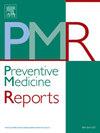Food insecurity, dietary intake, and their impact on mental health among university students in Bangladesh
IF 2.4
3区 医学
Q2 PUBLIC, ENVIRONMENTAL & OCCUPATIONAL HEALTH
引用次数: 0
Abstract
Objective
University students, a significant demographic within the adult population, may often face increased susceptibility to psychological distress and decreased resilience, probably due to the challenges of adjusting to a new life in university. Hence, this study aimed to explore how food insecurity and dietary intake are associated with psychological distress and resilience among university students in Bangladesh.
Methods
Information was collected from May to June 2024 among a sample of 450 students from Noakhali Science and Technology University, Noakhali district, Bangladesh, using a structured questionnaire assessing socio-demographic characteristics, food insecurity status, dietary intake, psychological distress, and resilience.
Results
Results revealed higher level of psychological distress and lower level of resilience among university students. Regression analysis (adjusted for socio-demographics) showed a significant positive association between food insecurity and psychological distress (b = 0.437, P = 0.005); however, food consumption score was negatively associated with psychological distress (b = −0.047, P = 0.012), indicating higher levels of distress among students experiencing higher food insecurity and lower dietary intake. On the other hand, resilience was observed to be negatively associated with food insecurity (b = −0.33, P = 0.003), suggesting that students facing higher food insecurity exhibited lower resilience levels.
Conclusion
The findings provided compelling evidence of the significant impact of food insecurity and dietary intake on mental health outcomes (psychological distress and resilience) among university students. Thus, addressing targeted interventions to improve university students' food insecurity and dietary intake to mitigate their psychological distress and resilience is of urgent need.
孟加拉国大学生的粮食不安全、饮食摄入及其对心理健康的影响
目的大学生是成年人口中的一个重要群体,可能由于适应大学新生活的挑战,他们可能经常面临心理困扰的易感性增加和适应能力下降。因此,本研究旨在探讨粮食不安全和饮食摄入如何与孟加拉国大学生的心理困扰和恢复力相关。方法于2024年5月至6月收集来自孟加拉国Noakhali地区Noakhali科技大学的450名学生的信息,使用结构化问卷评估社会人口特征、粮食不安全状况、饮食摄入、心理困扰和恢复力。结果大学生心理困扰水平较高,心理弹性水平较低。回归分析(经社会人口统计学调整)显示,粮食不安全和心理困扰之间存在显著正相关(b = 0.437, P = 0.005);然而,食物消费得分与心理困扰呈负相关(b = - 0.047, P = 0.012),表明在食物不安全程度较高、饮食摄入量较低的学生中,心理困扰程度较高。另一方面,弹性与粮食不安全呈负相关(b = - 0.33, P = 0.003),表明面临较高粮食不安全的学生表现出较低的弹性水平。结论食物不安全和饮食摄入对大学生心理健康结果(心理困扰和心理恢复力)的显著影响提供了令人信服的证据。因此,解决针对性的干预措施,以改善大学生的粮食不安全和饮食摄入,减轻其心理困扰和适应能力是迫切需要的。
本文章由计算机程序翻译,如有差异,请以英文原文为准。
求助全文
约1分钟内获得全文
求助全文
来源期刊

Preventive Medicine Reports
Medicine-Public Health, Environmental and Occupational Health
CiteScore
3.90
自引率
0.00%
发文量
353
 求助内容:
求助内容: 应助结果提醒方式:
应助结果提醒方式:


